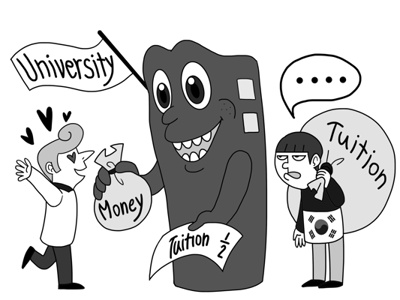
Closely achieving the goal of reaching 100,000 international students in Korea by 2012, Korean universities are improving the favorable conditions offered to international students, to encouraging them to enroll. However, some are now arguing that such conditions represent reverse discrimination against Korean students.
Among such benefits, tuition waivers and generous scholarships for international students stand out most conspicuously. Scholarship eligibility standards are also lower for international students attending universities in Korea compared to that of Korean students.
Some schools such as Korea University render scholarships that include full tuition with an additional monthly allowance for living expenses.
Korea University has two types of scholarships lasting for eight semesters: Scholarship Type A and Scholarship Type B. Type A includes the benefits of full tuition and a monthly stipend of 500,000 won. Type B provides only 50 percent of the tuition.
In order to gain constant benefits for Type A, the Grade Point Average (GPA) must be over 3.8 out of 4.5 and for Type B over 3.3, both having to acquire 12 credits per semester.
In contrast, Korean students have a higher requisite for receiving such scholarships. For Scholarship Type A, the benefits only include full tuition with students having to acquire 18 credits or more for every semester except the last year before graduation.
Hanyang University also has what appear to be generous scholarship programs for international students. Hanyang International Excellence Awards are given to those who have achieved notable academic progress at Hanyang University. The qualification for the award was a minimum GPA of 3.0 out of 4.5 in the previous semester, and the recipients receive up to a 70 percent tuition reduction.
Konkuk University also has a scholarship system in which the university provides 50 percent of the tuition for its international students in their first semester.
Yonsei University has arranged scholarship qualifications where international students with GPA of 2.5 out of 4.3, acquiring 10 credits per semester, are able to receive scholarships ranging from full tuition to half price.
On the other hand, Korean students’ requisites for scholarship awards are higher. In order to receive the same amount of scholarship, Korean students must have a GPA of 3.5 out of 4.3, while acquiring 12 credits per semester.
Ewha also has a scholarship program for the international students, called the International Exchange Scholarship (IES) which ranges from providing only the entrance fee to full tuition for four years. As for the international students in the undergraduate program, the Office of Admissions provides scholarships of full tuition for four years and half tuition for four years with a grade scale for continuous benefits. The students must receive a GPA over 3.0 out of 4.3 while acquiring 15 credits.
Many Korean students feel the low tuition and open-handed scholarships for the international students are unfair.
“Korea university’s tuition is very high and it is unfair that the school is giving large amounts of scholarships to international students who do not pay such large amounts to attend our school,” Cho Young-hwi (Korea University, 4) said. “I am afraid that such a trend will lead to creating a negative global image, where foreign students can freely enter at a cheap price.”
A university depends on the number of international students attending to gain positive marks on its index of internationalization assessment. Through an affirmative evaluation, the university becomes eligible to receive more financial support from the government. Thus, strategies to increase the number of international student admission have been enhanced to privilege those coming from abroad.
“I understand that the school is trying its best to rank higher in the world university reports,” Lee Jong-hwa (Yonsei University, 2) said. “But I think Yonsei should reduce the benefits for the international students so it can allow in more competent students with academic credentials rather than students who are looking for a better financial deal.”
Others feel that the scholarships and exemptions on tuitions are worth the cost.
“I do not think the generosity in tuitions and scholarships is a reverse discrimination against Korean students as international students do help in rearing global minds,” Nam Jong-yoon (Korea University, 3) said. “Since the tuitions are spent on developing the school’s image and for the students’ benefits, such privileges seem deserving.”
The Ministry of Education, Science and Technology (MEST) also acknowledges the seemingly generous financial aid towards international students in Korea.
“It is difficult for the government to interfere with each university’s scholarship programs for international students,” said an official in Global Human Resource Cooperation Team of the MEST, who wishes to stay anonymous. “The government advises universities to refrain from overly supporting them with the enforcement of the International Education Quality Assurance System.”

